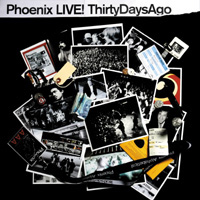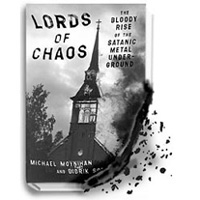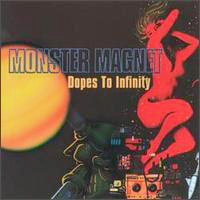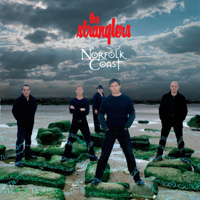 The Stranglers
The Stranglers
Norfolk Coast (Universal)
An interview with bassist Jean Jacques Burnel
By Martin Popoff
Anybody who’s read No Mercy, the bruising, frankly fantastic biography of The Stranglers, would logically be scared out of their wits at the prospect of talking to these guys. Turns out my life wasn’t in danger, with Jean Jacques Burnel turning out to be an articulate, polite, almost aristocratic English type. But, no doubt, it wasn’t always that way, and he might even be much darker on occasion these days. In any event, after briefly meeting the also immensely polite keyboardist, Dave Greenfield, at the bar doing crossword puzzles through bifocals, me and the wrangler of the thunderbroom (thanks, Watt!) sat down o’er tea at a posh hotel for a jaw about and around the band’s combative, authentic new album.
Even though I was a metalhead, I bought these records in the ’70s as new releases, No More Heroes, The Raven… It’s cool to tie those years together by chatting with you.
Yeah, first beer, first girl you had sex with. They’re very formative years, those late teen years. I was really fortunate. My parents were French restaurateurs, and they had a restaurant south of Guildford, in Surrey, in a little town called Godalming. I lived there for nine years. Godalming is famous for a public school called Charterhouse, which is where Genesis started. We had a little pub in town called The Angel Pub, and they had a little room in the back, and I saw, as a 14-year-old, Peter Green’s Fleetwood Mac front of 20 people. I used to see Free, before they were called Free, as Black Cat Bone. And as a 14-year-old, because I was too young, the older boys would smuggle me in because they knew I was fascinated by all this stuff. Chicken Shack, with Christine McVie still in the band, Aynsley Dunbar’s Retaliation, all these bands. So I’ve got an old, sort of nostalgic thing towards those old, so-called English blues bands. (laughs) They weren’t really blues bands.
You guys were also sort of crammed into some sort of genre. You weren’t really a new wave or punk band when you started out.
We were crammed in, yes, only because we came at the end of the pub rock thing. Fortunately, there was a pub rock circuit. It was on its last legs, and we found a few residencies so we could earn a few quid. Not much, but through the circuit we were able to ply our trade and learn how to front and develop our songs. Through that, I was fortunate enough to meet a band called Dr. Feelgood. I lived with Wilco Johnson for a year, in like ’77. Both of our styles… his was waning and mine was rising. I rediscovered rock’n’roll through bands like Dr. Feelgood.
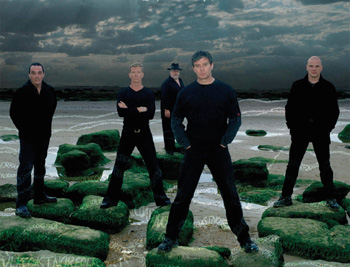 How long were you a pub rock band before the new wave explosion hit?
How long were you a pub rock band before the new wave explosion hit?
We were on the circuit for two years, ’75 and ’76. At the beginning of ’76, there were signs that something new was happening. We were starting to see more and more people with shorter hair. We had short hair and drainpipe jeans and leather jackets. We started to see more and more people coming to shows like that. Joe Strummer was getting more and more dissatisfied with his rhythm and blues band. He started hanging out with us. When he got drunk, he’d get quite morose and melancholic and cry on my shoulder saying “Oh, I wish I had a gang like you! I wish I had a band like you guys! I want a real gang.” Because we’d developed a ghetto mentality quite early on. I remember one night, early ’76, with Steve and Paul from The Sex Pistols, Chrissie Hynde came up and said, “I’m going to be your new singer.” We said “Well, we don’t even need you as a roadie.” (laughs) And things started changing during ’76. It was the nascent punk scene and there was a bit of a crossover. We didn’t have pretensions not to be able on our instruments; we were desperately trying to master our craft and write songs. (laughs)
Another oddball band in somewhat the same boat was The Vibrators. Were they seen to be a bit old for the scene?
Well, it was more jumping on the bandwagon. They were art school students. But they had a great pop sensibility, and actually, when you think about it, that power pop punky kind of playing has now become mainstream pop, hasn’t it? All the top bands now, they’re writing great little pop songs in the punky style. And at the time, punk seemed more like a branch of heavy metal with no solos. (laughs) The Ramones and everything; lots of the other bands were doing that. I thought the Ramones were the most characterless bunch of people I’d ever met. Or they kept their personalities to themselves. (laughs) Dee Dee tried having a personality. Junkies. It’s the heroin that becomes the personality. But a few bands, like us and The Clash, we liked the thrash, but there were also other elements such as reggae. But now, what’s this band, Blink Thing and #21… all these kids bands. They’re all busted. They’re all going back… The Offspring, Green Day, they’re all using that one element of the punk thing, and it’s now mainstream pop. And that makes the rest of us look good. (laughs)
Why did you have that very unique sound that you had? You could break it down to a unique bass sound, unique vocals, unique keyboard sound, even quite unique production.
Well, you could… That’s one way of looking at it. But every human being is unique, every voice is unique, every fingerprint is unique, so when that unique individual produces something creative, it should be unique! So when a group of unique individuals produce music, for instance, that uniqueness should surely come out in a unique piece of creativity, a unique piece of music. But it doesn’t, not necessarily. A lot of stuff now is really interchangeable. I was reading Miles Davis’ biography, and he hit the nail on the head. At one point, he was looking for his own musical voice, and he finally found it. Surely that’s what a musician should strive for, to transmit their uniqueness into their sound, their output. And I think we’ve found that.
But why your sound? For example, you’ve always been compared to The Doors. Not many have.
Well, I take that as a real compliment. The Doors weren’t quite as eclectic as us, musically. They were more of a blues band. But yeah, I don’t mind the comparison. I hope now, with the body of work we’ve produced, that we compare favorably with The Doors.
How about you personally? Did anybody ever tried to beat that aggressive buzzing bass sound out of you? You’re Lemmy and Entwistle all at once.
Well, (laughs) I don’t know. I mean, it’s just the way I play. I hit the strings quite hard when I’m using a pick. I don’t always use a pick though. It’s just the sound I can hear in my head; it’s the sound I want. I don’t always manage to reproduce it with the technology. Sometimes I get let down by the technology. But yeah, people have told me over the years, and now I believe them, that I have a unique bass sound. Why not?
Well, some people don’t consider the bass guitar a real musical instrument.
I don’t think they think that anymore. Since the late ’70s, I think, the bass has come into its own. And the bass player is not a shrinking violet anymore.
What about this new record? Did you have a philosophy going in to making it sound as much as it does like a classic Stranglers record?
Well, that’s what people are saying worldwide. Maybe it’s early to pronounce it as such. We did do a few things to preserve its integrity. We didn’t want to have any commercial pressures, so we got out of our record deal. We did this without any record company support, which was a vital thing. We didn’t have any deadlines, and it took us four years to get this body of work. I mean, there are another two albums of material left. So that was the first thing. The second thing was that we decided that every single track would be played live before we recorded it. We don’t play much these days, but during the summer festival season in Europe, we played before 85,000 people one night, 20,000 people another. So we get a chance to play these things, which we hadn’t done for 20 odd years. When you’re a young band, you’re collecting material, aren’t you? You’re playing the pubs or wherever, so the material gets honed. And then, with a bit of luck, you get a record contract, and you get a chance to record it, and you know how the material works. But then you go on a treadmill, don’t you? If you’re successful, you don’t get a chance to play these things, to run them in. We did that with every single track on this album. The end result was that we were in the studio for very little time.
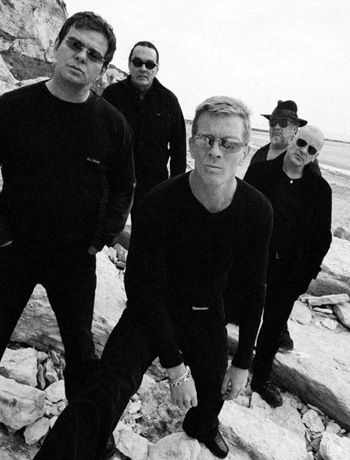 Can you really tell if the audience is into a new track or not?
Can you really tell if the audience is into a new track or not?
Yeah, of course you can. You feel something. You have to be quite sensitive. It’s one of the ironies, actually. If you’re a musician, one of the things you should have is sensitivity. But on the other hand, with the bricks and arrows, it’s hard. See, you develop a thick skin. On the one hand, you’re supposed to be sensitive, and on the other hand, you’re meant to be tough, to survive the ups and downs and the rejections. I mean, we were turned down by 25 record companies. That’s demoralizing for anyone. So you have to develop a thick skin, otherwise you would give up, wouldn’t you?
But you can feel it from people. Choruses come too early, or something doesn’t work. Or you see people’s eyes glazing over because a passage has gone on too long. So you refine it. It’s a really great way to work. Record companies don’t like you doing that type of thing because people get bootlegs of songs. But I think it’s the best way of testing out material.
What is the personality of the band, as demonstrated by your lyrics? Pessimistic, laconic?
I don’t know if it’s necessarily pessimistic or bleak. We do have a certain Weltanschauung, a collective worldview. But we don’t necessarily always agree on things. When we don’t agree on lyrical content, we dump the song.
What do you argue about lyrically?
The last time I fell out with someone, it was with Hugh. I wrote the lyrics for a song which never appeared in the end. My lyric was “Jesus Christ was not a Christian. He was a good old Jewish boy.” And it went on with stuff like that. Hugh said, “You can’t write stuff like that! The record company won’t like it.” And I said, “What are you talking about?! Jesus was a Jew! I’m not being anti-Semitic. I’m just saying Jesus Christ was a Jew. He wasn’t Christian. Christianity hadn’t been invented! What the fuck is going on here?!” Anyway, we just dropped it.
What is the personality of Norfolk Coast, lyrics-wise? Are there a couple of key lyrics you particularly like?
“Norfolk Coast” was the first song I wrote for it. “Big Thing Coming,” which I think is the second track on it, was the second song I wrote, and I wrote those two in one day after I had an experience on the beach. I rented this Jacobean cottage, like mid-1600s, in the sand dunes in Norfolk. The second week I was there, I walked past this thing, this structure, which apparently had just been revealed two days earlier by the receding dunes. The dunes had receded more than they had in living memory, revealing what turned out to be a Druidic structure two and a half thousand years old, which is the same general date as Stonehenge. It was made out of oak tree trunks, in a big circle, in the middle of which was an upturned tree trunk. So the roots were pointing upwards. That would’ve been the sacrificial altar, because the Druids did do human sacrifices. That triggered a whole line of thought in me, and everything came from there.
Why is The Raven such a doomy, dark album?
There are certain things we’re interested in that other people aren’t. I like, and I think most of us like, the esoteric. I remember years ago when we would go up to Glastonbury Tor and wait for the flying saucers to come, and they never fucking came. (laughs) I’m fascinated by history. I studied history and economic history. I’m fascinated by what makes mass groups of people do things which affect the rest of the world. We talk about there only being three dimensions, but I do believe there are lots more dimensions. And the human mind is capable of tapping into these other dimensions, and when it does, that’s when things are revealed. There are things that the brain is capable of, and I think humanity has lost the ability that some people can tap into.
(www.stranglers.net)

